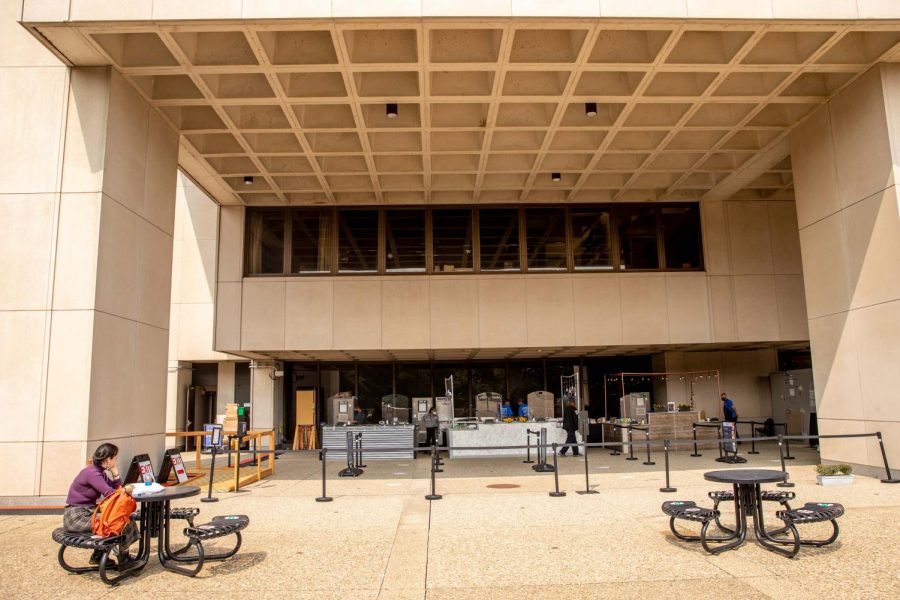Students offer mixed reviews of new meal plans, food under Compass Group
Kaycee Orwig | Assistant Visual Editor
The Hub, on the back patio of Posvar Hall, is a new, temporary outdoor dining location that opened Aug. 17.
September 16, 2020
While first-year students have the option to choose new friends, majors and decorations for their dorm room, one choice was already made for them before they ever stepped foot on campus.
Compass Group, Pitt’s new dining contractor, requires all first-year students living on-campus to have unlimited meal plans. The University previously worked with Sodexo for 29 years as its contractor, with its most recent 10-year contract ending this year. Along with new meal plans, students shared their opinions on new food options, dining location changes and safety.
Lien Ferry, a first-year biology major, said this new requirement was an unpleasant surprise because she had previously purchased a limited plan, and the cost increased with no warning.
“I didn’t like how we initially got to choose a less expensive dining plan, and then it got switched to a more expensive, unlimited plan,” Ferry said. “I would like to have more options.”
Joe Beaman, Pitt’s director of dining services, said meal plans are comparable in pricing to last year. Under Sodexo, there were five tiers of meal plans for “resident” students. The top tier included unlimited passes to eat at Market Central or The Perch and cost $2,650, with the bottom tier costing $1,550. But because first-year students are now required to purchase an unlimited plan under Compass Group, they will now be billed between $2,050 and $2,650.
Beaman added that the decision to require first-year students to purchase unlimited plans was meant to decrease their stress.
“Our goal is to provide first-year students with greater dining ease of use and value, eliminating the need to monitor, track or limit meals by providing unlimited access to The Eatery and The Perch,” Beaman said.
Not every student is required to purchase unlimited meal plans, though. Upperclassmen can buy cheaper, limited memberships, such as “The Foodie” and “Eat On The Run.”
Hannah Vorndran, a sophomore molecular biology major, purchased one of the “Eat On The Run” plans, which provides her with one meal swipe per day and 750 dining dollars. She said this plan works well for her because she doesn’t use many meal swipes.
“Being online, I find myself not really leaving my room to go get food,” Vorndran said. “I live in Ruskin, so we have a kitchen. A lot of what I’ve been using my meal plan for is going to Forbes Market to get groceries and ingredients to make food in my room.”
These new meal plans also have an hour wait time between using meal swipes on campus dining halls and include one meal exchange per day to use at an on-campus retail location. Pitt also allocated 25% of each student’s dining dollars toward off-campus dining locations around Oakland. The 27 partners include Fuel and Fuddle, Giant Eagle, Pamela’s and Sorrento’s Pizza Roma.
Vorndran said she likes the flexibility of dining dollars.
“I really like the feature that some dining dollars are accepted off campus,” Vorndran said. “Yesterday, I went with my roommates to Fuel and Fuddle and we used dining dollars, so that was really awesome.”
Vorndran added that she also enjoys the variety of locations that participate in meal exchanges along with dining dollars. Meal exchanges, a swap between a meal at The Eatery at Market Central or The Perch and another campus location, allow students to use a meal at retail locations on campus, such as Einstein Bros. Bagels and Chick-fil-A.
“The biggest change I’ve seen is that a lot of places that used to only take dining dollars are now accepting meal exchanges,” Vorndran said.
The two on-campus dining halls — The Perch and The Eatery — have undergone modifications as well, the most noticeable being the lack of seating due to the ongoing COVID-19 pandemic. Beaman said all meals are currently being offered to go to encourage social distancing.
“We are currently serving all meals to go to support the safety of the Pitt community,” Beaman said. “Takeout containers, silverware, cups and napkins are used at each campus dining location so that students can select their meal and depart.”
Vorndran said the dining halls were “super crowded” with people.
“I was very overwhelmed. There were huge lines everywhere, so you had to wait in line just to even see what food they had,” Vorndran said. “Last year, they had big TV screens set up that showed which food was being served at this station and this year they did not have that.”
Not every student is impressed by the quality of dining hall food offered by Compass Group. Rika Nallamala, an undecided first-year, said she thinks the food selections have gotten worse since she came to Pitt for a college visit last year.
“To be honest, the food is not the best,” Nallamala said. “When I came in to visit Pitt and they let us try the dining halls, there was a larger variety. Now, it’s always the same pizza and burgers.”
Ferry said she wasn’t too impressed by the quality of the food, either. She said she considers it “decent overall,” but most of it is “kind of bland.”
Along with more to-go meals, Beaman said new safety protocols were introduced to protect workers and students. He said this includes frequent cleaning and sanitizing, social distancing and mask wearing as well as sanitizer stations available at each dining area. He said Pitt has also put in place “safety concierge stations” outside numerous locations, including the Cathedral of Learning and the William Pitt Union, to check students’ temperatures before they go in to grab a bite.
Another newcomer to campus is the The Hub, a temporary outdoor dining location on the back patio of Posvar Hall, which opened Aug. 17. It offers a variety of menu options, such as the soon-to-open Smokeland BBQ.
Beaman said Compass Group opened a number of new locations across campus, including two additions to the Cathedral Cafe — The Roost and Pom & Honey. The Roost is a chicken-based eatery, and Pom & Honey will offer customizable salads, grain bowls and wraps. Schenley Cafe, located on the WPU’s lower level, will see new restaurants as well. True Burger will provide burgers, fries and milkshakes, and CrEATe will have made-to-order salads.
Beaman added that Pitt has also launched its Tradecraft coffee cart program, where local roasters occupy Pitt’s coffee cart locations.









